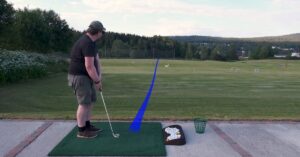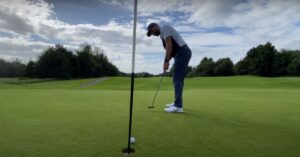Are Golfers Athletes? Unveiling the Hidden Fitness Regimen of Golfers
Golf is a sport that has been played for centuries, but there has been a long-standing debate about whether golfers are athletes. Some argue that golf is more of a leisurely activity than a sport, while others believe that it requires physical and mental prowess. So, are golfers athletes?
While golf may not require the same level of physical exertion as other sports, it does demand a high level of skill, precision, and endurance, making golfers athletes in their own right.
The blog post could then go on to discuss the different factors that contribute to a golfer’s success, such as strength, flexibility, coordination, and mental toughness.
5 Reasons Why Golfers Are Not Athletes
Golf is a sport enjoyed by millions around the world, but some may argue that golfers are not athletes. While golf requires skill, precision, and mental focus, here are five reasons why some may not consider golfers as athletes.
Limited Physical Demands
Compared to traditional athletic activities like running, basketball, or soccer, golf has relatively low physical demands. Golfers typically walk or use a golf cart to move around the course, and the swinging motion, while requiring technique, does not involve the same level of physical exertion as many other sports.
Lack Of Cardiovascular Fitness
Unlike sports that involve continuous running, jumping, or intense physical activity, golf does not significantly contribute to cardiovascular fitness. While golfers may have endurance to walk the course for several hours, the intermittent nature of the game does not provide sustained aerobic exercise.
Minimal Muscular Strength And Power
Golfers primarily rely on technique, precision, and coordination rather than brute muscular strength or power. While some strength is necessary for driving the ball, it is not comparable to the explosive power and strength required in sports like weightlifting or sprinting.
Non-Competitive Nature
Golf is often played individually, and while tournaments exist, the direct competition against opponents is limited. This lack of head-to-head physical competition can be seen as a factor that distinguishes athletes in other sports, where the competitive element is a central aspect.
Mental Focus Dominates Physicality
While golf does require physical prowess, the mental aspect is often regarded as more crucial. Golfers must strategize, make split-second decisions, and maintain focus over long periods.
The mental demands of the game may overshadow the physical elements, leading to a perception that golfers are not primarily athletes.
Why Golf Is A Game Not A Sport?
Golf is often considered a game rather than a sport due to its unique characteristics and historical origins. While it requires skill and athleticism, it lacks the physical intensity and direct competition found in traditional sports.
Golf’s Historical Origins
Golf originated in Scotland during the 15th century as a recreational pastime for nobility. It was initially played casually and lacked the competitive structure of modern sports.
Lack Of Direct Competition
Unlike traditional sports such as basketball or soccer, golf does not involve direct competition against an opponent. Players compete against themselves and the course, aiming to achieve the lowest score.
Skill And Technique
Golf requires significant skill and technique, including precision, strategic thinking, and mastery of various shots. However, these attributes are also found in games like chess, where physical prowess is not a defining factor.
Physical Intensity
Compared to sports like football or basketball, golf has a lower physical intensity. It does not require the same level of strength, speed, or endurance. Players can excel in golf without possessing exceptional athletic abilities.
Leisurely Pace And Etiquette
Golf is often associated with a leisurely pace and a strong emphasis on etiquette. The game encourages players to maintain a calm and composed demeanor, further distinguishing it from the competitive nature of sports.
Athleticism In Professional Golf: Examples Of Exceptional Physical Abilities

From strength and flexibility to endurance and coordination, athletes in this sport must possess a well-rounded athleticism. Let’s explore some examples of the physical attributes that contribute to success in professional golf.
Power And Distance
Driving the ball long distances is a crucial aspect of the game. Players with exceptional power generate high clubhead speeds, allowing them to hit the ball farther down the fairway. This requires a combination of strength, explosive muscular power, and proper technique to maximize distance.
Flexibility And Range Of Motion
Golfers need a wide range of motion to execute smooth and efficient swings. Flexibility in the hips, shoulders, and spine enables a full backswing and follow-through, contributing to improved accuracy and consistency. Regular stretching and mobility exercises are essential for maintaining flexibility.
Core Stability And Balance
Maintaining a stable core and proper balance is vital for a consistent and controlled golf swing. Strong core muscles, including the abdominals, back, and pelvis, provide stability and help transfer energy from the lower body to the upper body during the swing.
Endurance And Stamina
Golf tournaments can be physically demanding, often lasting several days with multiple rounds. Endurance and stamina are crucial for maintaining focus and performance throughout the tournament.
Physical conditioning, including cardiovascular exercises and strength training, helps golfers stay energized and minimize fatigue.
Hand-Eye Coordination
Precise hand-eye coordination is fundamental in golf, especially when it comes to aligning the clubface accurately, making solid contact with the ball, and controlling the direction and trajectory of shots. Developing this coordination through practice and drills can enhance overall performance.
Fine Motor Skills
Golfers rely on fine motor skills for delicate and precise movements during putting and short game shots.
Subtle adjustments in grip pressure, clubface angle, and swing path can significantly affect the outcome of a shot. Developing fine motor skills through focused practice can lead to improved touch and control around the greens.
Mental Strength And Focus
While not strictly a physical attribute, mental strength and focus play a significant role in golf performance. The ability to stay composed under pressure, maintain concentration throughout the round, and manage emotions can make a difference between success and failure on the course.
Frequently Asked Questions
Golf is a sport that has often sparked debates about whether its participants can be considered athletes. Here are some FAQs that address the question of whether golfers are athletes
What Physical Skills Do Golfers Need?
Golfers require a combination of strength, flexibility, coordination, and balance to perform well. They must possess core stability, rotational power, and excellent hand-eye coordination to execute precise swings consistently.
Is Golf A Physically Demanding Sport?
Although golf is not as physically demanding as sports like basketball or soccer, it still requires endurance, especially during multi-day tournaments.
Walking long distances while carrying clubs and playing under challenging weather conditions can be physically taxing.
How Does Golf Impact Mental Abilities?
Golf requires immense mental focus, strategic thinking, and the ability to handle pressure. Golfers must make precise calculations, plan shots, adapt to changing conditions, and maintain concentration throughout the entire round.
Can Golfers Sustain Injuries?
Despite not being a contact sport, golf can lead to injuries, particularly if players have poor swing mechanics or overuse certain muscles. Common injuries include back pain, tendonitis, golfer’s elbow, and wrist injuries. Proper warm-up, conditioning, and technique are crucial for injury prevention.
Do Professional Golfers Undergo Physical Training?
Professional golfers recognize the importance of physical conditioning and often engage in specific training programs. These programs aim to enhance strength, flexibility, and overall fitness levels, helping golfers optimize their performance and reduce the risk of injuries.
Conclusion
While there may be differing opinions on whether golfers are considered athletes, it is undeniable that professional golfers possess a unique combination of physical skills and mental abilities that contribute to their success in the sport.
The physical demands of golf, such as power, flexibility, balance, and endurance, require athletes to maintain a high level of athleticism to excel at the highest level.






